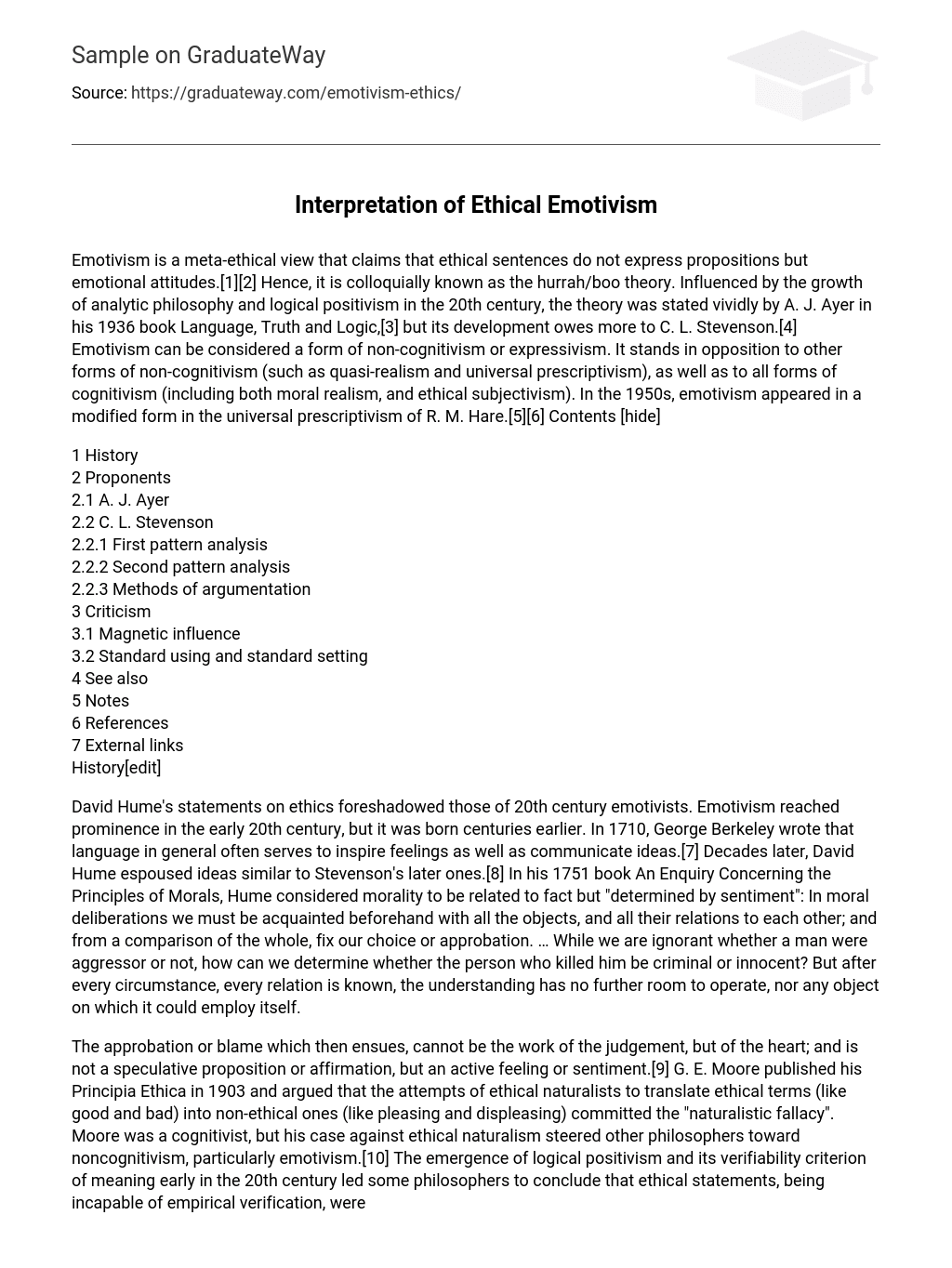Emotivism is a meta-ethical view that claims that ethical sentences do not express propositions but emotional attitudes.[ Hence, it is colloquially known as the hurrah/boo theory. Influenced by the growth of analytic philosophy and logical positivism in the 20th century, the theory was stated vividly by A. J. Ayer in his 1936 book Language, Truth and Logic, but its development owes more to C. L. Stevenson.
Emotivism can be considered a form of non-cognitivism or expressivism. It stands in opposition to other forms of non-cognitivism (such as quasi-realism and universal prescriptivism), as well as to all forms of cognitivism (including both moral realism, and ethical subjectivism). In the 1950s, emotivism appeared in a modified form in the universal prescriptivism of R. M. Hare.
David Hume’s statements on ethics foreshadowed those of 20th century emotivists. Emotivism reached prominence in the early 20th century, but it was born centuries earlier. In 1710, George Berkeley wrote that language in general often serves to inspire feelings as well as communicate ideas. Decades later, David Hume espoused ideas similar to Stevenson’s later ones.
In his 1751 book An Enquiry Concerning the Principles of Morals, Hume considered morality to be related to fact but “determined by sentiment”: In moral deliberations we must be acquainted beforehand with all the objects, and all their relations to each other; and from a comparison of the whole, fix our choice or approbation. … While we are ignorant whether a man were aggressor or not, how can we determine whether the person who killed him be criminal or innocent? But after every circumstance, every relation is known, the understanding has no further room to operate, nor any object on which it could employ itself.
The approbation or blame which then ensues, cannot be the work of the judgement, but of the heart; and is not a speculative proposition or affirmation, but an active feeling or sentiment. G. E. Moore published his Principia Ethica in 1903 and argued that the attempts of ethical naturalists to translate ethical terms (like good and bad) into non-ethical ones (like pleasing and displeasing) committed the “naturalistic fallacy”. Moore was a cognitivist, but his case against ethical naturalism steered other philosophers toward noncognitivism, particularly emotivism. The emergence of logical positivism and its verifiability criterion of meaning early in the 20th century led some philosophers to conclude that ethical statements, being incapable of empirical verification, were cognitively meaningless.
This criterion was fundamental to A.J. Ayer’s defense of positivism in Language, Truth and Logic, which contains his statement of emotivism. However, positivism is not essential to emotivism itself, perhaps not even in Ayer’s form, and some positivists in the Vienna Circle, which had great influence on Ayer, held non-emotivist views. R. M. Hare unfolded his ethical theory of universal prescriptivism in 1952’s The Language of Morals, intending to defend the importance of rational moral argumentation against the “propaganda” he saw encouraged by Stevenson, who thought moral argumentation was sometimes psychological and not rational.
But Hare’s disagreement was not universal, and the similarities between his noncognitive theory and the emotive one — especially his claim, and Stevenson’s, that moral judgments contain commands and are thus not purely descriptive — caused some to regard him as an emotivist, a classification he denied: I did, and do, follow the emotivists in their rejection of descriptivism. But I was never an emotivist, though I have often been called one.
But unlike most of their opponents I saw that it was their irrationalism, not their non-descriptivism, which was mistaken. So my main task was to find a rationalist kind of non-descriptivism, and this led me to establish that imperatives, the simplest kinds of prescriptions, could be subject to logical constraints while not [being] descriptive.





